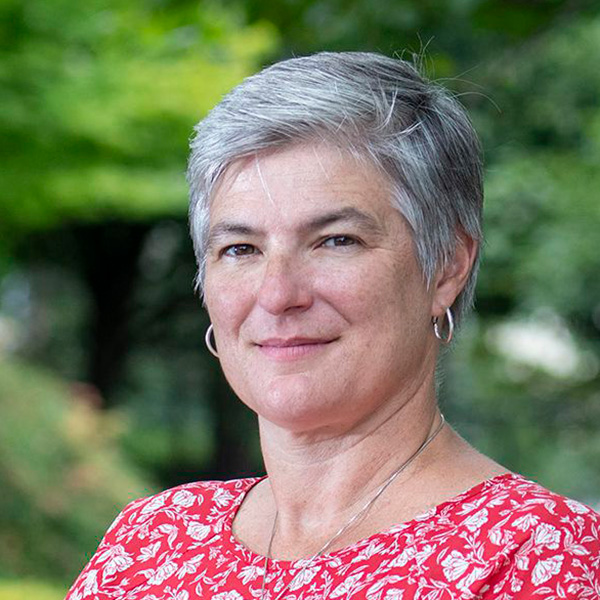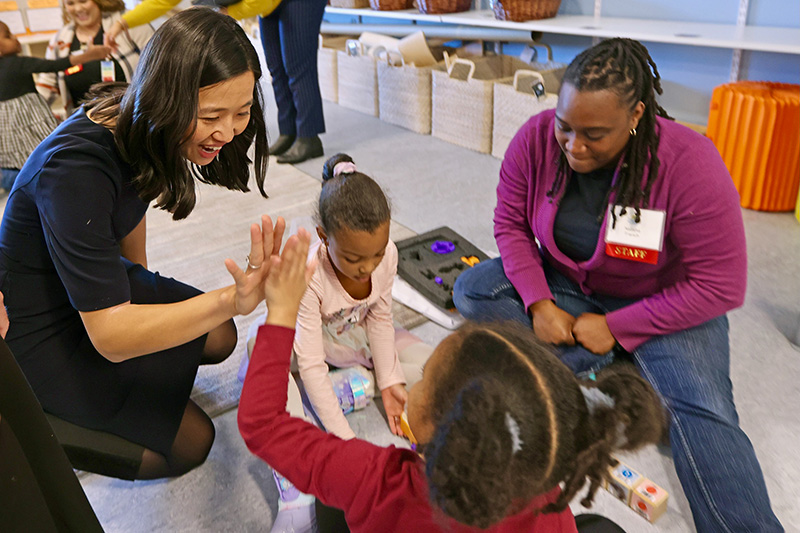When workers leave an industry in droves because the pay is better at fast-food chains or because they can’t take the stress of their jobs for one more day, that’s what you call a workforce crisis—and it’s the day-to-day reality across the nation’s early care and education (ECE) sector. While “crisis” indicates that a situation is urgent and dangerous, this crisis has been on a slow roll for decades. COVID-19 didn’t cause the situation, but the pandemic drew back the curtain and made its structural flaws visible and impossible to ignore. If ever there were a time to address this systemic brokenness, it would be now.
Rather than try to patch together the broken bits, the City of Boston has created the Office of Early Childhood to tackle the brokenness and undertake systemic change that covers the waterfront of what’s missing and what’s needed in the early childhood sector. In tandem with announcing the department’s creation in early 2022, Mayor Michelle Wu released findings from Boston’s 2021 Child Care Census Survey report, “Making Child Care Work.” With three staff members and a large vision, the Office of Early Childhood makes the needs expressed in this survey its core priorities:
- Expanding high-quality, affordable early education and child care options for infants and toddlers
- Accelerating the creation of a city-wide universal pre-K system
- Investing in the early care and education workforce by building sustainable career pathways for educators
- Creating a one-stop shop for enrollment and access to ECE programs by building an accessible, multilingual web portal
- Coordinating outreach and information related to city-run and community-led programs that affect the lives of young children and their families.
“Our goal is to make Boston the most family-friendly city,” says Kristin McSwain, director of the Office of Early Childhood and a senior advisor to Mayor Wu. “Our mayor is committed that Boston needs to grow and thrive. One of the ways to make sure that happens is by having families. You can’t have families without early care and education, and right now, that infrastructure is incredibly fragile.

“Investing in the people who are going to take care of our youngest people is critical for the City of Boston, for right now and for the future,” McSwain says.
To that end, Mayor Wu announced in November that the City of Boston is granting $7 million of its funds from the American Rescue Plan Act (ARPA) to four Boston entities to grow the early childhood workforce. The grants will support almost 800 degrees or certifications at no cost to participants, providing coursework and degrees recognized by the Massachusetts Department of Early Education and Care. These will include Childhood Development Associates (CDA) certification and renewals, and lead teacher certifications all the way up to master’s degrees. The grants will require program participants to fulfill a two- or three-year commitment to work in the City’s early childhood education sector, providing much-needed stability to the sector.
The grantees—Bunker Hill Community College, Neighborhood Villages, Urban College and the University of Massachusetts-Boston—will provide soup-to-nuts support to childhood educators and those who aspire to be. Whatever applicants need, from tuition, books and supplies to child care, transportation, technical support and other financial assistance, will be provided.
If it sounds as though the initiative’s creators have thought of everything, that’s the point, McSwain says.
“When you enter a profession, you usually have lots of options,” McSwain says. “You choose what meets your individual needs—time, financial concerns, whatever it is—you choose a program tailored to what you need it to do. What we’ve done in this space is fund multiple strategies so that people who want to enter early childhood education have a variety of on-ramps that will meet their individual needs.
“’Do I need my own child care? Do I need to work and study later in the day?’ Whatever it is, we’ve seen to it that there are a lot of different strategies,” she says. “As a professional, you have the opportunity to choose what fits best with what you need to advance your career and to clearly articulate what these early educators’ pathways are to get whatever credential they want to pursue.”
The Office of Early Childhood is also leveraging economic development statutes and funding to encourage the creation of new child care facilities and to support those that already exist. Since the 1970s, a zoning regulation called Inclusion of Daycare Facilities (IDF) has been on Boston’s books (“’Daycare’ because … 1978,” McSwain says.) requiring that in 14 downtown zoning districts, certain large developments had to include child care programs on site or support the creation of off-site programs. Under these rules, developers have been able to fulfill their obligations by contributing to a fund that supports child care in Boston. However, the amount of those contributions has been subject to per-project negotiation which created an opaque and inconsistent process.

In July, Wu signed the Executive Order on Inclusion of Daycare Facilities which expands on this existing requirement to make the zoning conditions more transparent and predictable as well as providing a stable funding source of the Office of Early Childhood. With approximately 3 million square feet of development currently under review, the new formula could generate more than $3.5 million to support the department, which will use the funds to expand and support high-quality child care through grants to providers, training, and technical assistance and upgrades to facilities such as retrofitting for energy efficiency or installing high-quality air filters.
Responding to Changes in the Sector
How and where parents want child care has been changing throughout the pandemic, McSwain said, and her office wants to be able to build child care where the kids are and where the parents want them to be—which may not be on-site at their place of employment. The Executive Order gives her department the flexibility to create high-quality child care where families need it most, she says. A strong emphasis in all these initiatives is to recruit and train teachers for infants and toddlers, an area where there’s a critical shortage and thus, a powerful demand. The department’s goal is to have 75 new family child care providers within 16 months, and McSwain says the work has already begun on that.
In early February, the department is launching a media campaign to target individuals who might consider early childhood as a career, to let them know that whatever their considerations about cost, about their own child care, about their schedules, the City of Boston has their backs and will pay for them to make that leap.
Another economic development approach the agency is working on is to view family child care through a small-business lens, as micro enterprises that require the same kinds of support that anyone setting up a business would need, such as tax help, assistance setting up an LLC or help creating a business plan.
The City of Boston is using some of its ARPA funding earmarked for economic development to coax businesses back into parts of the city that they have left for various reasons. One of those priority businesses is child care, which the city will support with aid including reduced rent, new signage and assistance meeting licensure requirements.
Two of the issues creating the greatest instability in ECE infrastructure are legendary low pay, which leads to incessant workforce churn, and a chronic failure to view the ECE workforce as a professional one and invest accordingly in training and development. The ARPA workforce grants are a powerful step in recognizing and training a professional workforce. The question of compensation is one that still has many moving parts, McSwain says.
The City’s goal is for providers to pay $22 an hour for a starting teacher and McSwain’s department is working to identify the gap between what people should be paid and what the provider is able to pay, then work with providers to create sustainable compensation plans that may rely on a mix of private and subsidies.
Lifting Up Existing Programs
The Office of Early Childhood is well on its way to achieving its vision of becoming all things early childhood for all of Boston’s residents, though there is no shortage of work yet to be done. The department’s website offers resources such as health and safety information; assistance with housing, clothing and essentials; and energy services for eligible households as well as recommendations for popular playgrounds and parks, special family friendly events and listings of local libraries. Part of its mission has been to uplift existing programs and work to expand on what’s available. The city now has universal Pre-K, available through a mixed delivery model that offers parents a choice of settings that work best for them. The Boston Public Schools and community-based providers offer the same free, high-quality Pre-K program to all 3- and 4-year-olds in the city. Family child care providers are being trained and added for the 2023-2024 school year.
A Public Need, A Public Good
When Mayor Wu announced creation of the Office of Early Childhood, she underscored how the COVID-19 pandemic highlighted the strain a lack of affordable and accessible child care puts on families and the community. Before the pandemic, that might not have been such a universally accepted statement. Now, McSwain says, no one’s arguing the point.
“All the bosses watching all the little kids walking back and forth past the camera made it kind of undeniable,” she says. “’Oh, there’s another one …’ But no one is saying, ‘No, you know what? We don’t need to invest that money in child care.’ The city council and others disagree about plenty of issues, but not this one.
“The pandemic focused people on the fact that child care is necessary infrastructure,” she says. “However, I don’t think it’s convinced everyone that child care should be a public good and is something we should pay for—yet. We’re closer now, but we still have to close that gap.”

K.C. Compton
K.C. Compton worked as a reporter, editor and columnist for newspapers throughout the Rocky Mountain region for 20 years before moving to the Kansas City area as an editor for Mother Earth News. She has been in Seattle since 2016, enjoying life as a freelance and contract writer and editor.



